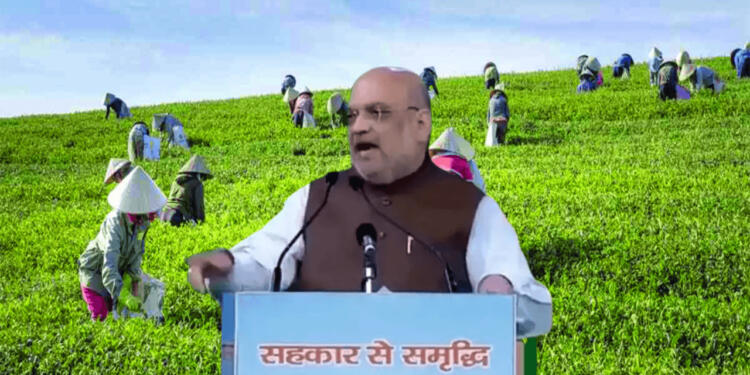- Cooperatives Minister Amit Shah has chalked out a strategy for aligning cooperatives in India’s future growth story
- The credit for increasing India’s farm productivity lies directly with the flourishing of lakhs of credit societies in India
- Modi giovernment needs to bring in more nuanced and refined strategy for channelising cooperatives
If there is any part of the Indian economy which symbolises BHARAT, then it is our cooperatives. The area has been underutilised when it comes to its potential. But now, Amit Shah has envisaged it to be a catalyst of India’s goal of being a $5 trillion economy.
Amit Shah announces arrival of cooperatives era
Union Cooperatives minister Amit Shah has reemphasised that India’s cooperative sector will help realise Modi government’s goal of opportunity enriched economic growth. He said that the benefit of a cooperative’s larger contribution in GDP will be that it will scale up our productivity numbers along with providing job opportunities to crores of people. Laying out cooperatives’ role in India’s growth, Amit Shah said, “I can say with confidence that, in the coming days, the area of cooperation is going to make the largest contribution towards realising PM Narendra Modi’s dream of a 5 trillion dollar economy,
Job centred Aatmanirbhar Bharat
Shri Amit Shah was addressing a gathering of milk producers of the Surat District Co-Operative Milk Producers’ Union Ltd. (Sumul). He asserted that Cooperatives will help India become Aatmanirbhar in true sense.
Pointing out cooperatives’ contribution to welfare of the people, Union Minister said, “If Sumul gets strong, its two-and-a-half lakh (member milk producers) benefit. If a private dairy gets strong, only five people benefit. If the cooperative sector becomes strong, the country’s farmers, cattle farmers, owners will get strengthened, and the idea of Atmanirbhar Bharat will grow,”
Modi government is betting on cooperatives
Shri Shah’s promotion of Cooperatives’ role is indicative of Modi Government’s strategy about cooperatives. Last month it was reported that Union government is working on new policy for cooperatives in the country. The new policy is expected to bring efficiency in digitisation of primary agricultural credit co-operative societies, scheme for creation of national database of co-operative societies, cooperative education and training scheme, co-operative credit guarantee fund, cooperative to prosperity scheme and national co-operation policy.
Cooperatives’ importance can be gauged from the fact that Modi government decided to form a separate cooperative ministry to regulate the sector. Amit Shah himself took the responsibility of running the ministry.
Cooperatives and India-A brief snapshot
As per data given by the National Cooperative Union of India, India’s cooperatives sector is the largest in the world. It covers 98 percent of the country’s length and breadth, with nine lakh socities with a membership of around 290 million people. Also, 91 percent of villages across India have the presence of cooperative societies and now the centre wants to go international.
It’s only on the back of these cooperatives that India became hub of green and white revolution in 20th century. According to the 2019-20 annual report by the National Dairy Development Board, these daily cooperatives had procured 4.8 crores litres of milk from 1.7 crore members. They also sold 3.7 crores litres of liquid milk per day. In the sugar sector, cooperatives are responsible for the production of more than 35 per cent of the total sugar produced in the country.
Read more: Amit Shah’s big plans for cooperatives and what might be the ramifications of it
Agricultural and role of cooperatives
Cooperatives play a big role in influencing the agricultural growth of our country. Most Indian farmers have extremely low literacy rates, so it becomes difficult for them to deal with bureaucracy. Their problems get exacerbated when they go to avail farm loans from the banks. PACS coordinates with these farmers and compile data regarding their requirements.
These PACS then report to district central cooperative banks (DCCBs), from where short-term loans are sanctioned. At the top of the lending hierarchy are state cooperative banks (SCBs) which mainly finance agri-processing industries such as sugar mills or spinning mills.
In its annual report of 2019-20, NABARD estimated a total of 363 DCCBs and 33 state cooperatives in the country. The report highlighted that the DCCBs sanctioned short-term loans worth Rs 3, 00,034 crores in 2019-20, while state cooperative banks sanctioned Rs 1, 48,625 crores in loans.
Read more: Amit Shah is empowering cooperatives to weed out bureaucratic corruption from the Farm sector
Cooperatives are backbone of Indian developmental story. When big business houses were reluctant to go to villages due to license raaj, it was cooperatives that provided food to an average Indian. If their potential is not harnessed then India’s growth story will be incomplete. Modi government’s initiatives about cooperatives need to be lauded and simultaneously government needs to work towards making polic more refined and nuanced.
























